Unit 2 Morals and Virtues Listening and Talking课件(共12张,内嵌音频) 2024-2025学年高一英语人教版(2019)必修3
文档属性
| 名称 | Unit 2 Morals and Virtues Listening and Talking课件(共12张,内嵌音频) 2024-2025学年高一英语人教版(2019)必修3 | 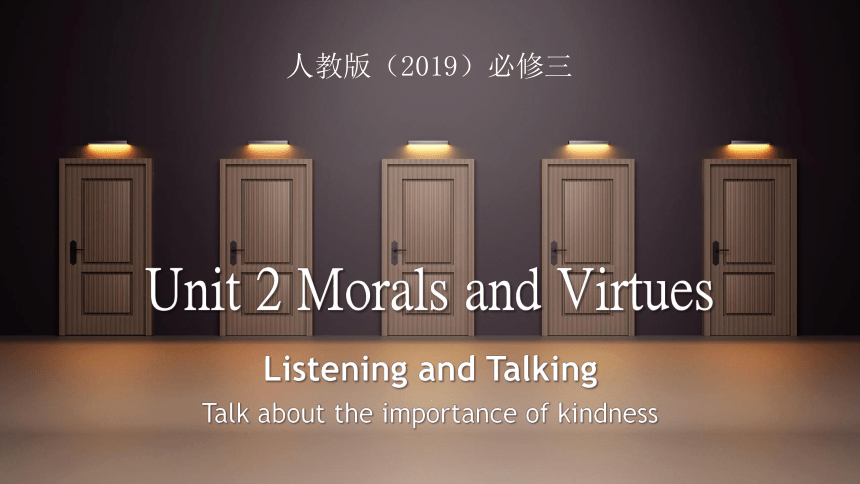 | |
| 格式 | pptx | ||
| 文件大小 | 19.3MB | ||
| 资源类型 | 教案 | ||
| 版本资源 | 人教版(2019) | ||
| 科目 | 英语 | ||
| 更新时间 | 2025-04-16 13:30:18 | ||
图片预览

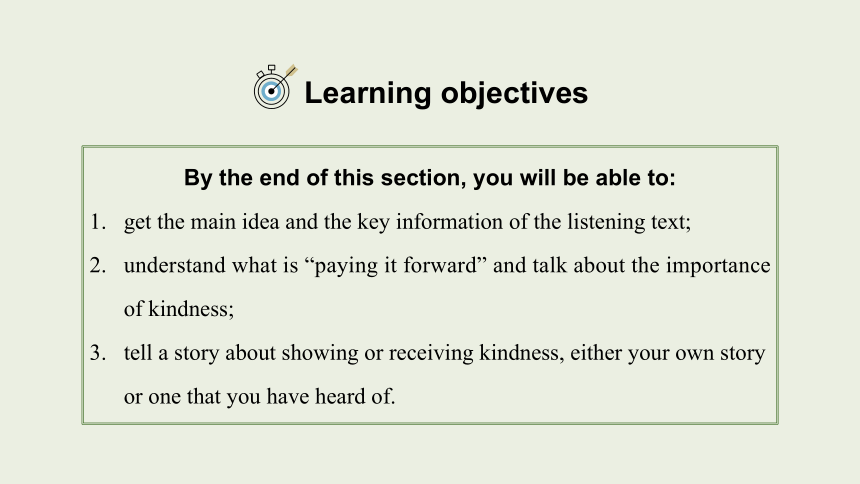
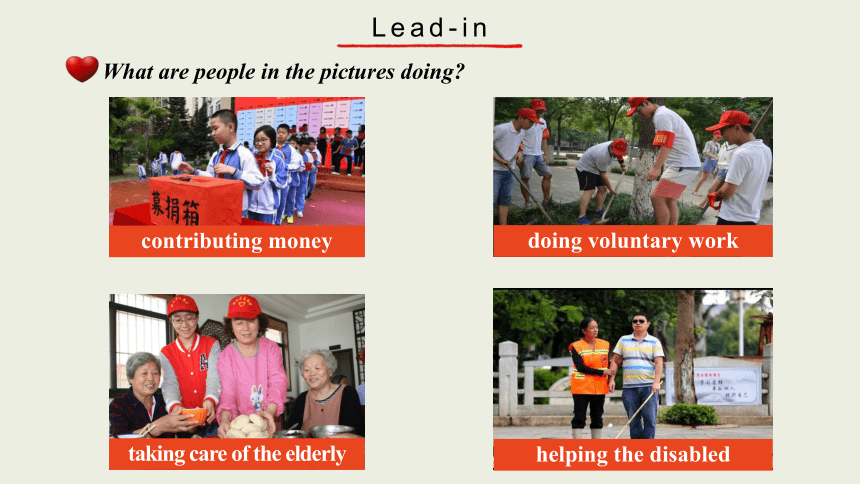
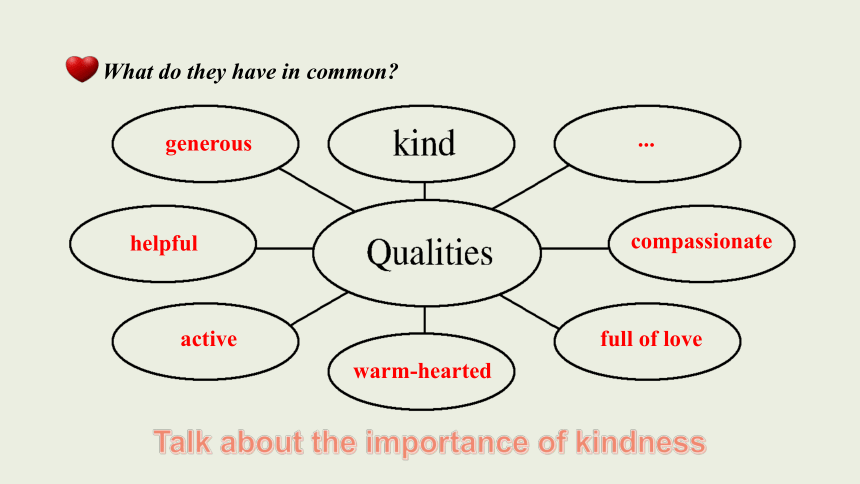
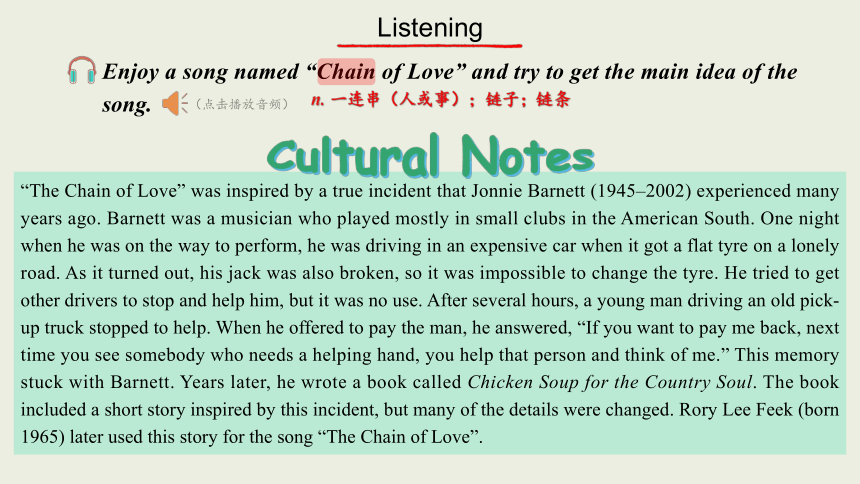

文档简介
(共12张PPT)
人教版(2019)必修三
Unit 2 Morals and Virtues
Listening and Talking
Talk about the importance of kindness
Learning objectives
By the end of this section, you will be able to:
get the main idea and the key information of the listening text;
understand what is “paying it forward” and talk about the importance of kindness;
tell a story about showing or receiving kindness, either your own story or one that you have heard of.
Lead-in
What are people in the pictures doing
contributing money
doing voluntary work
taking care of the elderly
helping the disabled
What do they have in common
generous
...
compassionate
full of love
warm-hearted
active
helpful
Talk about the importance of kindness
Enjoy a song named “Chain of Love” and try to get the main idea of the song.
“The Chain of Love” was inspired by a true incident that Jonnie Barnett (1945–2002) experienced many years ago. Barnett was a musician who played mostly in small clubs in the American South. One night when he was on the way to perform, he was driving in an expensive car when it got a flat tyre on a lonely road. As it turned out, his jack was also broken, so it was impossible to change the tyre. He tried to get other drivers to stop and help him, but it was no use. After several hours, a young man driving an old pick-up truck stopped to help. When he offered to pay the man, he answered, “If you want to pay me back, next time you see somebody who needs a helping hand, you help that person and think of me.” This memory stuck with Barnett. Years later, he wrote a book called Chicken Soup for the Country Soul. The book included a short story inspired by this incident, but many of the details were changed. Rory Lee Feek (born 1965) later used this story for the song “The Chain of Love”.
Cultural Notes
Listening
(点击播放音频)
n. 一连串(人或事);链子;链条
Listen to a radio show and answer these questions.
The name of the radio show is “Rush Hour Show”.
“Paying it forward” means when you receive kindness from someone, you go out and show kindness to another person.
The guest wants the audience to join the chain of kindness and “pay it forward”.
1. What is the name of the radio show
2. What does “paying it forward” mean
3. What does the guest want the listeners to do
Suggested Answers
(点击播放音频)
Listen to the radio show again and fill in the blanks to complete the story.
I’m sure you’ve heard the famous country music song “Chain of Love”. The song starts with a man who helps a lady whose car _______________. The lady wants to pay him, but he won’t accept payment, instead telling the lady to just ____________ to another person. Later, when the lady stops at a café, she notices her waitress is pregnant and _____. When the lady finishes eating, she pays for her meal with a __________________. Then the lady walks out, _________ the change and a note for the waitress. Her note tells the waitress to continue the chain of kindness. The song has a ________ ending. The waitress goes home to her _______, happy because of the kindness the lady showed her. Finally we find out that he is the man who first ______ the chain of kindness!
has broken down
show kindness
tired
hundred-dollar bill
leaving
surprise
husband
started
(点击播放音频)
n. 咖啡馆;小餐馆
n. (餐馆的)女服务员;女侍者
adj. 怀孕的;妊娠的
Host: Hello and welcome to the Rush Hour Show, the radio show for your way home. Our guest today is Kevin Miller, with
the Pay It Forward Foundation. Welcome, Kevin, so what is “paying it forward”
Kevin: Hi, there. So “paying it forward” means that if you receive kindness from someone, you don’t try to pay them back.
Instead, you go out and show kindness to someone else.
Host: Oh, so it’s like helping a stranger. Can you give us an example of how it works
Kevin: Well, I’m sure you’ve heard the famous country song, “The Chain of Love”. The song starts with a man who helps a
lady whose car has broken down. The lady wants to pay him, but he won’t accept payment, instead telling the woman to
just show kindness to another person. Later, when the lady stops at a café, she notices her waitress is pregnant and tired.
When the lady finishes eating, she pays for her meal with a hundred-dollar bill. Then the lady walks out, leaving the
change and a note for the waitress. Her note tells the waitress to continue the chain of kindness. The song has a surprise
ending. The waitress goes home to her husband, happy because of the kindness the lady showed her. Then we find out
that he’s the man who first started the chain of kindness!
Host: What a great story! So does this happen in real life
Kevin: Yes, actually. One woman, after paying for her coffee, then quietly paid for the coffee of the customer behind her. When
that customer discovered his coffee had been paid for, he paid for the customer behind him. The chain of kindness
continued for hours. Nearly 400 people paid for the coffee of the person behind them!
Host: Wow, that’s amazing. So what can our listeners do to help
Kevin: Well, join the chain of kindness today and join the millions of people who are “paying it forward”! We never know what
light we might spark in others by our kindness.
Transcript
Tell a story
When telling a story, you can start by saying what the story is about. Give the background to the listeners, including when and where it took place. Say what happened step by step and be sure to use correct tenses. Do not forget to use sequencing words or linking words.
Finally, finish your story by saying why it is important to you or why you remember it.
Telling a story
Time: once upon a time, long ago, one day;
Sequence: first of all, then, after that, later, finally, afterwards, meanwhile, at last, in the end, eventually;
Place: next to, far from, on the left, in front of;
Logical relation: so, however, although, but, otherwise, nevertheless, as a result, therefore, furthermore, in addition, as well as;
Ending: in a word, in short, on the whole, to sum up, in brief;
I remember this happened when I was ...
I was on my way to ...
I was sitting ... when ...
It was a ... day/morning ...
There were ... on the street ...
Talking
Learn how to tell a story.
Think of a story of showing or receiving kindness, either your own story or one that you have heard of. Then share it with your group.
Once, I did not have money to go to university, and so someone paid my tuition that term. This happened when I was eighteen. My grandmother had just died, and this had caused my family great expense, so we had no extra money at all. I did everything I could to raise the money, but it seemed hopeless. Then the morning that the tuition was due, someone gave my mother an envelope with the money. It wasn’t their money, and they wouldn’t say who it was from. It seems that some stranger had heard about my money problem and decided to help. This meant so much to me, as without it I would not have been able to go to university.
Suggested Answer
Homework
Write a story about showing or receiving kindness.
人教版(2019)必修三
Unit 2 Morals and Virtues
Listening and Talking
Talk about the importance of kindness
Learning objectives
By the end of this section, you will be able to:
get the main idea and the key information of the listening text;
understand what is “paying it forward” and talk about the importance of kindness;
tell a story about showing or receiving kindness, either your own story or one that you have heard of.
Lead-in
What are people in the pictures doing
contributing money
doing voluntary work
taking care of the elderly
helping the disabled
What do they have in common
generous
...
compassionate
full of love
warm-hearted
active
helpful
Talk about the importance of kindness
Enjoy a song named “Chain of Love” and try to get the main idea of the song.
“The Chain of Love” was inspired by a true incident that Jonnie Barnett (1945–2002) experienced many years ago. Barnett was a musician who played mostly in small clubs in the American South. One night when he was on the way to perform, he was driving in an expensive car when it got a flat tyre on a lonely road. As it turned out, his jack was also broken, so it was impossible to change the tyre. He tried to get other drivers to stop and help him, but it was no use. After several hours, a young man driving an old pick-up truck stopped to help. When he offered to pay the man, he answered, “If you want to pay me back, next time you see somebody who needs a helping hand, you help that person and think of me.” This memory stuck with Barnett. Years later, he wrote a book called Chicken Soup for the Country Soul. The book included a short story inspired by this incident, but many of the details were changed. Rory Lee Feek (born 1965) later used this story for the song “The Chain of Love”.
Cultural Notes
Listening
(点击播放音频)
n. 一连串(人或事);链子;链条
Listen to a radio show and answer these questions.
The name of the radio show is “Rush Hour Show”.
“Paying it forward” means when you receive kindness from someone, you go out and show kindness to another person.
The guest wants the audience to join the chain of kindness and “pay it forward”.
1. What is the name of the radio show
2. What does “paying it forward” mean
3. What does the guest want the listeners to do
Suggested Answers
(点击播放音频)
Listen to the radio show again and fill in the blanks to complete the story.
I’m sure you’ve heard the famous country music song “Chain of Love”. The song starts with a man who helps a lady whose car _______________. The lady wants to pay him, but he won’t accept payment, instead telling the lady to just ____________ to another person. Later, when the lady stops at a café, she notices her waitress is pregnant and _____. When the lady finishes eating, she pays for her meal with a __________________. Then the lady walks out, _________ the change and a note for the waitress. Her note tells the waitress to continue the chain of kindness. The song has a ________ ending. The waitress goes home to her _______, happy because of the kindness the lady showed her. Finally we find out that he is the man who first ______ the chain of kindness!
has broken down
show kindness
tired
hundred-dollar bill
leaving
surprise
husband
started
(点击播放音频)
n. 咖啡馆;小餐馆
n. (餐馆的)女服务员;女侍者
adj. 怀孕的;妊娠的
Host: Hello and welcome to the Rush Hour Show, the radio show for your way home. Our guest today is Kevin Miller, with
the Pay It Forward Foundation. Welcome, Kevin, so what is “paying it forward”
Kevin: Hi, there. So “paying it forward” means that if you receive kindness from someone, you don’t try to pay them back.
Instead, you go out and show kindness to someone else.
Host: Oh, so it’s like helping a stranger. Can you give us an example of how it works
Kevin: Well, I’m sure you’ve heard the famous country song, “The Chain of Love”. The song starts with a man who helps a
lady whose car has broken down. The lady wants to pay him, but he won’t accept payment, instead telling the woman to
just show kindness to another person. Later, when the lady stops at a café, she notices her waitress is pregnant and tired.
When the lady finishes eating, she pays for her meal with a hundred-dollar bill. Then the lady walks out, leaving the
change and a note for the waitress. Her note tells the waitress to continue the chain of kindness. The song has a surprise
ending. The waitress goes home to her husband, happy because of the kindness the lady showed her. Then we find out
that he’s the man who first started the chain of kindness!
Host: What a great story! So does this happen in real life
Kevin: Yes, actually. One woman, after paying for her coffee, then quietly paid for the coffee of the customer behind her. When
that customer discovered his coffee had been paid for, he paid for the customer behind him. The chain of kindness
continued for hours. Nearly 400 people paid for the coffee of the person behind them!
Host: Wow, that’s amazing. So what can our listeners do to help
Kevin: Well, join the chain of kindness today and join the millions of people who are “paying it forward”! We never know what
light we might spark in others by our kindness.
Transcript
Tell a story
When telling a story, you can start by saying what the story is about. Give the background to the listeners, including when and where it took place. Say what happened step by step and be sure to use correct tenses. Do not forget to use sequencing words or linking words.
Finally, finish your story by saying why it is important to you or why you remember it.
Telling a story
Time: once upon a time, long ago, one day;
Sequence: first of all, then, after that, later, finally, afterwards, meanwhile, at last, in the end, eventually;
Place: next to, far from, on the left, in front of;
Logical relation: so, however, although, but, otherwise, nevertheless, as a result, therefore, furthermore, in addition, as well as;
Ending: in a word, in short, on the whole, to sum up, in brief;
I remember this happened when I was ...
I was on my way to ...
I was sitting ... when ...
It was a ... day/morning ...
There were ... on the street ...
Talking
Learn how to tell a story.
Think of a story of showing or receiving kindness, either your own story or one that you have heard of. Then share it with your group.
Once, I did not have money to go to university, and so someone paid my tuition that term. This happened when I was eighteen. My grandmother had just died, and this had caused my family great expense, so we had no extra money at all. I did everything I could to raise the money, but it seemed hopeless. Then the morning that the tuition was due, someone gave my mother an envelope with the money. It wasn’t their money, and they wouldn’t say who it was from. It seems that some stranger had heard about my money problem and decided to help. This meant so much to me, as without it I would not have been able to go to university.
Suggested Answer
Homework
Write a story about showing or receiving kindness.
